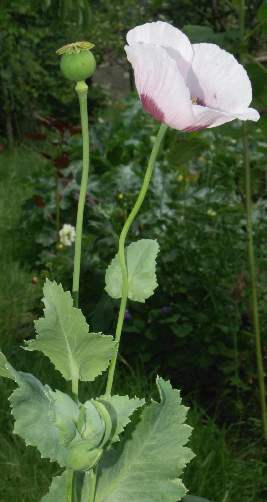Poppy plant is a biennial herb of East Mediterranean, and Asia Minor origin belonging to the Papaveraceae family of the genus: Papaver. Scientific name: Papaver Somniferum. Poppy seeds are tiny kidney shaped seeds. It is taken from dried pods Seeds are numerous, very small, white grey with an oily endosperm.




Poppy is a self pollinated plant. The seed is the spice. Poppy seeds are cultivated in temperature and sub- trophical region and requires well drained, high fertile, light black cotton soil and good percentage of fine sand.

The centre of orgin of poppy seed is Europe amd cultivated in India, Poland, Germany, China and Portugal. It is mainly cultivated for its medicinal use. Nutty and pleasant in taste, poppy seeds are nutritious
oilseeds used as condiment in cooking.

They are the seeds obtained from the dry fruits (pods) of
the poppy plant (opium poppy) and entirely free from any sinister side effects
of other poppy plant products such as opium poppy.
Poppy Seeds Health Benefits:
- Poppy seeds are used as a healing remedy for quenching thirst, inflammation, constipation and irritation of the abdomen.
- Poppy seeds also are used as narcotics to treat pain-related conditions
- Poppy seeds are used in treating respiratory disorders, infectious diseases, diarrhoea and sleep disorders.
- Poppy seeds contain Linoleic acid that is beneficial in preventing heart disorders and abdomen conditions.
- Poppy seeds are one of the necessary ingredients in many cooling medicines.
- Poppy seeds add flavour and texture to breads, cookies, muffins, cakes and other foods.
- Poppy seeds act as a supply of your daily dose of minerals like iodine, manganese, zinc, magnesium and copper.
- The oil from poppy seeds plant is useful in treating carcinoma as it contains monounsaturated fatty acids.
- These seeds have a decent supply of fatty acids and are rich in omega-3 fatty acids.
- As an Ayurvedic medicine, these seeds are sometimes grounded into a paste with milk to form a skin-renewing moisturizer.
Skin and Hair benefits
- You can prepare a face scrub by mixing 2 teaspoons of poppy seeds with curd. Rub it gently on clean face and neck in circular motions, massaging for 10 minutes. Then wipe off your face with a cotton ball and wash off as usual. This will provide you with a clear and glowing complexion.
- A paste made from poppy seeds acts as a good moisturizer to provide you with smooth and soft skin. All you need to do is put some poppy seeds in a spice hand grinder and add some milk to it. If you have dry skin, you can also add some honey. Grind into a smooth paste and apply it all over your face. Relax for 10 minutes and then wash off. Doing this once in a week will provide a fragile transparency to your skin.
- Hair problems like dandruff, hair loss, thinning hair, split ends and alopecia are a common sight these days. There can be several causes of these problems ranging from harsh chemical treatments and exposure to pollution to inadequate nutrition and prolonged illness.
- It is a well-known fact that proper nutrition is vital not only for a healthy body but also for healthy hair. Poppy seeds are a good source of unsaturated fatty acids as well as minerals like calcium, zinc and magnesium which contribute to healthy hair.
- Dandruff is a common problem which, if left untreated can lead to hair loss.In case of dandruff, you can apply a mixture of soaked poppy seeds, hung curd and a teaspoon of white pepper on the scalp. Leave for half an hour and then rinse off. Regular usage of this pack will significantly reduce the recurrence of dandruff.
- In order to trigger hair growth, you can prepare a hair pack by blending soaked poppy seeds with freshly extracted coconut milk and pulped onion. Apply it on your scalp and leave for about an hour. Rinse off with a mild shampoo. Regular usage of this pack will greatly stimulate hair growth.
No comments:
Post a Comment